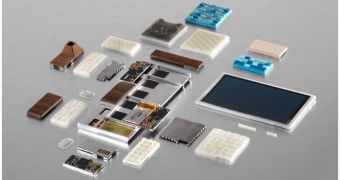Late last year, Google unveiled plans to bring to the market a smartphone that would deliver far more customization capabilities when compared to the currently available handsets out there, namely Project Ara, and some more info on the phone’s chip is now available.
Unlike other handsets, Project Ara will be built with a series of 5 to 10 modules inside, one for each of the various hardware components that users usually like to see inside mobile devices.
As it turns out, Google has partnered with Toshiba for the development of this smartphone, and this is the company that will supply it with chips for the device.
According to a recent report from Nikkei, Toshiba is actually building three different types of processors for the device.
These chips, claims the news site, are set to be used both inside the handset itself and in the aforementioned modules that will be featured in the device.
For those out of the loop, we should note that Project Ara will come with a chassis designed to work as an endoskeleton, allowing users to add various components to it, in the form of modules.
As mentioned above, each handset will offer support for 5 to 10 modules, which can be added to the phone’s back, and which fit together like blocks.
The modular design of the smartphone will allow users to easily switch components to modify the device in line with their needs.
However, it seems that the modular design of Project Ara was what determined Google to partner with Toshiba for the initiative, as the device would need chips capable of accurately control the flow of data and electrical signals between the endoskeleton and its modules.
Google and Toshiba are said to have been working on this since October last year, and the latter has been already approved as the preferred supplier for the line, it seems.
Moreover, the aforementioned report claims that Toshiba is not just the only Japanese chip maker to have joined the project, but that it is also expected to become the sole chipmaker for the device in about one year after its release.
Previously, Google confirmed that drivers for Project Ara were expected to be ready by December this year, and that the first devices in the series could arrive on the market in January 2015.
Most probably, the company will provide some additional details on this as the release date approaches, so stay tuned to learn the news.

 14 DAY TRIAL //
14 DAY TRIAL //